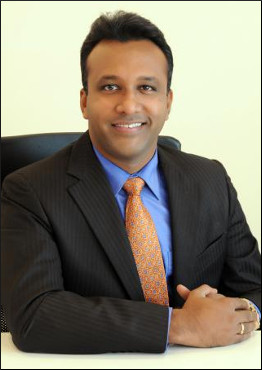|

|
Private sector can help boost higher education quality in India: JGU VC
|
|

|
|
| Top Stories |
 |
|
|
|
SME Times News Bureau | 30 Oct, 2018
With higher education institutions in India, barring a handful
struggling to make a mark at the global level, Vice chancellor of O.P.
Jindal Global University (JGU) in Sonipat, Haryana, Professor C. Raj
Kumar, is vouching for greater engagement from the private sector to
improve both quality and access to higher education in India.
Professor
Kumar -- Rhodes scholar at the University of Oxford, where he obtained
his Bachelor of Civil Law (B.C.L.) degree; and a Landon Gammon Fellow at
the Harvard Law School -- became the founding VC of the university in
2009 and, in the nine years since, he has guided the institution to rank
among the top 450 universities in Asia, as per the QS Asia University
Rankings 2019.
In an email interview, he sheds light on
how the higher education system is burdened by over-regulation and why
more corporates and high net worth individuals should come forward to
support the government in making India a preferred global destination
for pursuing higher education and research.
What is ailing India's higher education system? What kind of reforms, according to you, can improve the system?
C. Raj
Kumar: The Indian higher education system is over-regulated and
under-governed. This is evident in recent government policies that aim
to reduce regulatory oversight through initiatives such as Graded
Autonomy for well-performing institutions, and the Institutions of
Eminence project that will allow for selected institutions to
self-regulate on key aspects such as recruitment, admissions and
collaborations. However, given the gap in scale, access and relative
quality of higher education in the country, further reforms are urgently
needed to match the rapid expansion of the sector with performance and
quality. We also need greater engagement from private actors, including
from industry, to promote quality in higher education.
What is stopping private universities in India from becoming world-class universities?
C. Raj
Kumar: If one were to look at the parameters on which international ranking
agencies such as THE (Times Higher Education), QS (Quacquarelli Symonds)
and ARWU (Academic Ranking of World Universities) operate, one would
notice common metrics such as research, reputation and
internationalisation. Indian universities primarily focus on teaching
and less on research. Secondly, functions of internationalisation (i.e.
hiring of foreign faculty members, admitting foreign students and
building student mobility programmes) within higher education
institutions are currently over-regulated by the government. For private
universities to flourish, there needs to be greater balance between
government oversight, functional autonomy and a diversified funding
ecosystem within the country for such institutions.
How can Indian universities improve rankings in list of the world's top universities?
C. Raj
Kumar: Indian universities need to prioritise research impact and outcomes.
There is greater need for funding in Indian universities, which ought to
come from both public and private sources. Secondly, the regulations
that encumber the internationalisation efforts of universities need to
be eased. Universities need to be encouraged to promote all forms of
internationalisation. We need to create an ecosystem in which students
from other parts of the world should desire to study in India just as we
create opportunities for student mobility programmes where Indian
students go abroad for various short- and long-term programmes. All of
this will require greater support from the government and private
actors.
What measures should India put in place to improve access to higher education among the underprivileged?
C. Raj
Kumar: While public universities now provide the broadest access to students
from under-represented and disadvantaged communities, private higher
education institutions need to play a far greater role in expanding
access to quality higher education in India. The higher education sector
is yet to see meaningful private participation in a not-for-profit mode
where corporates and high net worth individuals support access to
quality higher education. O.P. Jindal Global University is a stellar
example of private, not-for-profit and corporate philanthropy in higher
education. Unfortunately, for a large country like India, there are very
few such examples and we need more of them.
What role do you see for universities in shaping the future of the nation?
C. Raj
Kumar: A nation is built on the basis of its people and, indeed, institutions.
Visionaries who inspire others and change the way of doing things are
critical in every effort to build a nation. In order for our citizens to
dream, aspire and inspire, there needs to be greater imagination and
efforts in creating enabling and inspiring environments in the form of
university spaces where teaching, learning and research can happen.
Institution-building is central to nation-building and that is how we
can create an enabling environment for the future.
|
|
|
| |
|
|
|
|
|
|
|
|
|
|
|
|
|
|
| |
| Customs Exchange Rates |
| Currency |
Import |
Export |
US Dollar
|
84.35
|
82.60 |
UK Pound
|
106.35
|
102.90 |
Euro
|
92.50
|
89.35 |
| Japanese
Yen |
55.05 |
53.40 |
| As on 12 Oct, 2024 |
|
|
| Daily Poll |
 |
 |
| Do you think Indian businesses will be negatively affected by Trump's America First Policy? |
|
|
|
|
|
| Commented Stories |
 |
|
|
|
|
|
| |
|